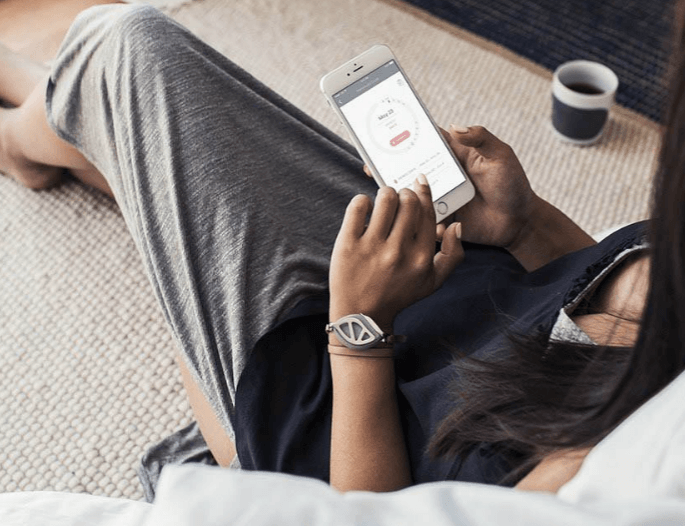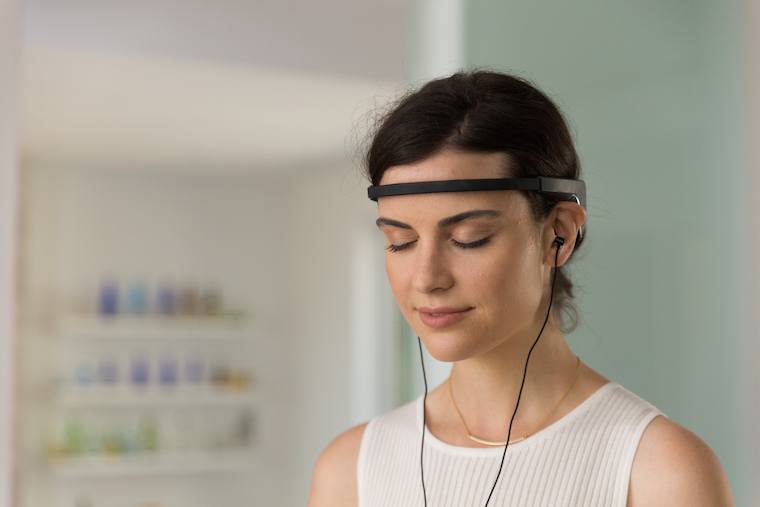Beyond Movement: the New Wave of Wearables Track Mindfulness
In August, Caeden introduced the Sona, a stylish bracelet that tracks how you deal with stress (based on a high-tech sensor and metric) and then provides research-backed meditations. In September, Bellabeat's Leaf Urban debuted a stress prediction feature it says calculates "stress sensitivity." Apple Watch revealed the Breathe app as part of its latest round of updates, and Fitbit's new Charge 2 comes with Relax Mode, both of which offer guided breathing exercises. In the off-wrist category, devices like Spire, Pip, and Muse promise to improve your breathing, track your stress levels, and make meditation easier. So yeah, it's definitely become a thing.
"They were all focused on steps and doing more physical activity, and the biggest thing we were combating at work was stress and trying to find balance."
Caeden co-founders Nora Levinson and David Watkins were working on wearables for big tech companies when they realized there was another health issue that wasn't being addressed by the devices. "They were all focused on steps and doing more physical activity, and the biggest thing we were combating at work was stress and trying to find balance. We wanted to really build something that took into account the mind-body component," Levinson says. "There’s a lot of scientific research about ways to measure stress and quantifiable methods to improve levels, and we wanted to bring that to people."
The Sona's sensor does that by using a metric called heart rate variability (HRV), which essentially measures heart-rate patterns in a way that demonstrates how your nervous system is recovering from stress. "You're actually seeing the tug-of-war between your stress response and your relaxation response," she explains. "If you're super well-rested, you adapt and respond to every change in the environment. If you're experiencing chronic stress or not getting enough rest, your body is sluggish to respond."

To change that, Sona gives you daily goals that default to 30 minutes of physical activity, and, more importantly, 10 minutes of Resonance breathing, a research-backed meditative technique developed in the Russian cosmonaut program in the 60s (yes, really). "What they ended up finding is that if you train someone to breathe at this frequency over a long period of time, you can get them into this cool, calm, focused state, and it also has lasting benefits in that they're strengthening their relaxation response," Levinson says. "You’re essentially strengthening your ability to recover from stressful situations." (Pro tip: One potentially stressful situation you're going to need to recover from right away is figuring out how to put the Sona on—there's a hidden clasp!)
"My clients are consistently concerned with whether they are meditating 'correctly.' These products are able to deliver some tangible feedback that makes people feel like they are on track."
In the Sona app, every time you do a Resonance meditation (there are choices like "Rise," "Relax," and "Boost," and you can choose the length), the sensor tracks how well you're breathing along with the instructions using the same metric, so you get stats when you're done and can see how you get better at relaxing over time.

{{post.sponsorText}}
Julia Samton, MD, a neurologist, psychiatrist, and meditation expert who's the co-founder of ReMind Meditation, believes that's one reason these kinds of trackers could be effective. "My clients are consistently concerned with whether they are meditating 'correctly.' These products are able to deliver some tangible feedback that makes people feel like they are on track," she says.

That's even more true with Muse, which is a different kind of "wearable" entirely. You certainly can't wear the brain wave-sensing headband throughout the day as a stylish accessory, but you can put it on if you feel like you're "bad at meditating"—the device's soothing sounds change when your mind starts to wander. For example, one minute you're totally focused on your breath and listening to soft rain fall; the next, you start thinking about how you forgot to put peanut butter on your grocery list and suddenly you're hearing a monsoon. The change alerts you to refocus, and when birds chirp that means you're killing it. Again, you can see how you did at the end and track your improvements in the app.
But even if you don't want to go that deep, simply having the Breathe app on your Apple Watch home screen or a Pip ready on your desk could help you start to appreciate the importance of managing stress. "One of the biggest obstacles in practicing meditation and mindfulness is to remember to do it," Dr. Samton says. "A device like this is a constant reminder that you are committed to making this kind of change in your life."
Temperatures may be dropping, but your workout routine is heating up! Check out our Fall Fitness Preview, your guide to having your healthiest fall yet. And make sure to mark your calendars: Well+Good's annual Fitness Biathlon in NYC is back this October 22.
Loading More Posts...